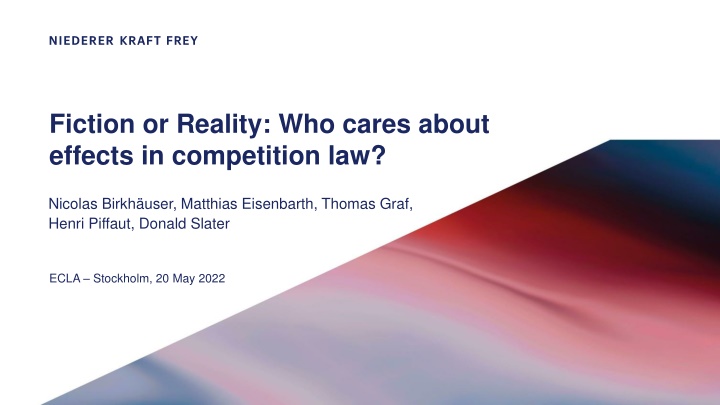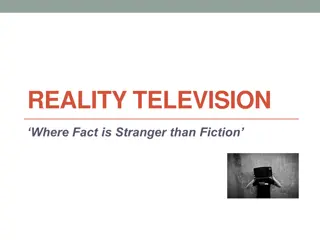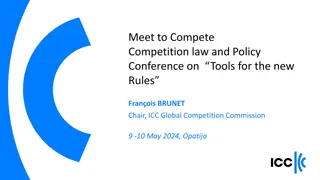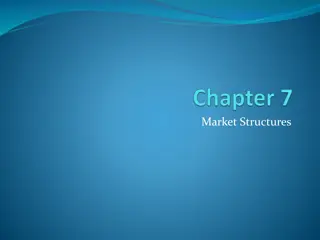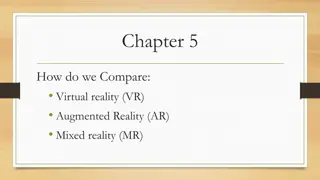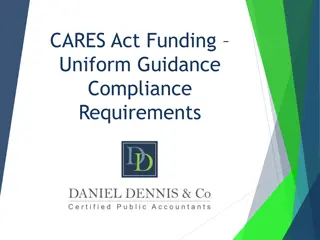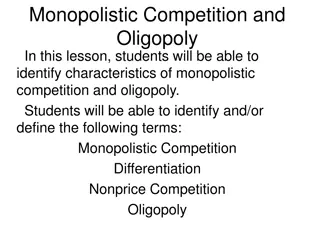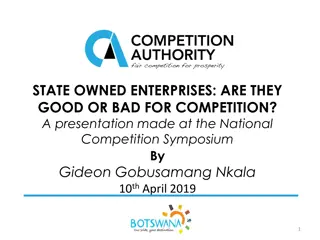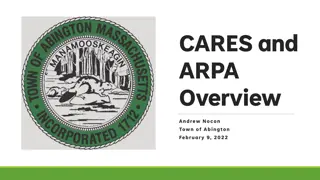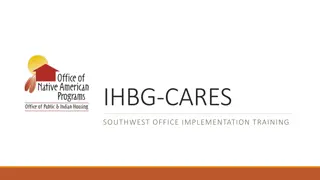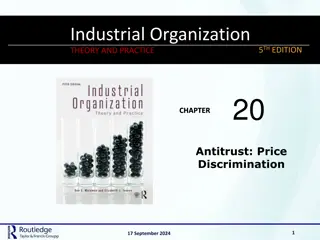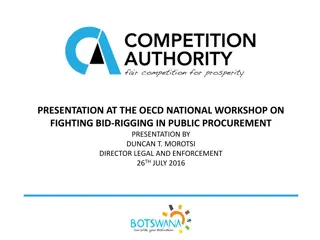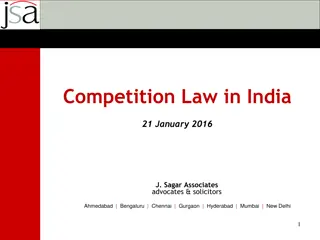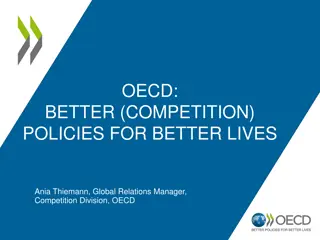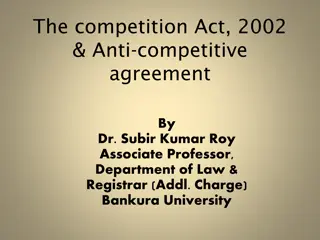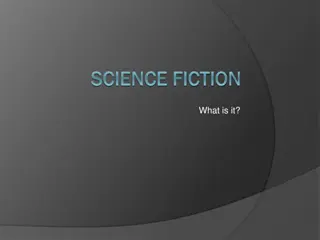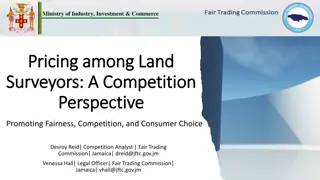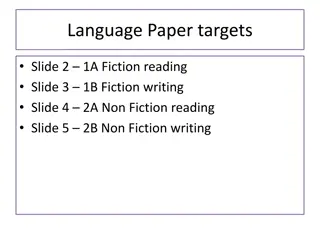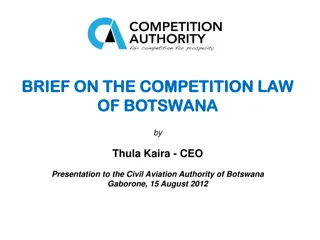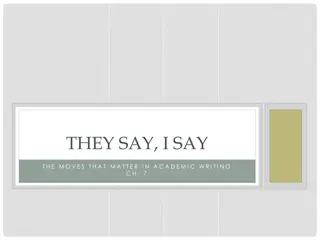Fiction or Reality: Who Cares About Effects in Competition Law?
This intriguing discussion delves into the intersection of fiction and reality in competition law, exploring the impact of effects on legal frameworks. Join the insightful dialogue to gain a deeper understanding of this critical issue.
Download Presentation

Please find below an Image/Link to download the presentation.
The content on the website is provided AS IS for your information and personal use only. It may not be sold, licensed, or shared on other websites without obtaining consent from the author.If you encounter any issues during the download, it is possible that the publisher has removed the file from their server.
You are allowed to download the files provided on this website for personal or commercial use, subject to the condition that they are used lawfully. All files are the property of their respective owners.
The content on the website is provided AS IS for your information and personal use only. It may not be sold, licensed, or shared on other websites without obtaining consent from the author.
E N D
Presentation Transcript
Fiction or Reality: Who cares about effects in competition law? Nicolas Birkh user, Matthias Eisenbarth, Thomas Graf, Henri Piffaut, Donald Slater ECLA Stockholm, 20 May 2022
Your panelists (1): Matthias Eisenbarth is currently responsible for all legal and corporate affairs matters for AB InBev in Central Europe. Matthias has profound expertise in government relations, external communications, crisis management and the full range of legal topics that come with the job in one of the world s leading FMCGs. In corporate affairs, his clear focus has been to raise corporate reputation while proactively shaping the regulatory environment. Thomas Graf joined Cleary Gottlieb in 2000 and became a partner in 2009. Thomas practice focuses on EU competition law, regulatory affairs, and intellectual property law. His experience includes work in a number of industries, including, IT, pharmaceuticals, media, sports rights, energy and engineering. He has represented clients in many landmark cases before the European Commission, national competition authorities and the European courts. 2
Your panelists (2): Henri Piffaut is a Vice President of French Competition Authority. He is a former Adviser to the Deputy Director General for mergers at DG Competition of the European Commission. He has spent most of his career in the competition policy field. During the academic year 2016/17 he served as a fellow at Harvard University where he pursued research on the interaction of competition policy and platform industries. Donald Slater is a partner in Ashurst's competition and EU law practice. Donald has specialised in EU law since 2000, mainly working in private practice but also in the EU institutions and academia. He has a broad and deep experience of litigation before the European Courts, having represented clients in a range of cases from cartels and State aid to regulatory cases and VAT. Donald returned to Ashurst in 2018 after spending three years in the European Court of Justice in the chambers of an Advocate General, working on cases in all fields of EU law, with particular emphasis on regulatory law. 3
Your panelists (3): Nicolas Birkh user is a partner in Niederer Kraft Frey's competition practice in Zurich. He combines his practice in competition law with strong expertise in IP. Nicolas has extensive experience representing companies in cartel and abuse of dominance investigations as well as in merger control proceedings, including multijurisdictional coordination. Nicolas also focuses on IP, including in particular transactions and IP related contracts. 4
Fiction or Reality: Who cares about effects in competition law? Why this topic? Everyone has their own personal experience. Don't they? E.g. pricing / rebates cases (Art. 102). E.g. information exchange (Art. 101). Same principles for effects analysis across all alleged restrictions under Art. 102, whether price abuse or non-price abuse? Comparison of Google Shopping vs. Intel. What is / should be the test: Whether or not there is a foreclosure of as efficient competitors? Sufficient? / Other tests. Same principles also under Art. 101? 5
Fiction or Reality: Who cares about effects in competition law? What are anticompetitive effects? The fist question probably is: Do we need effects? Is it right to demand that there must be effects? Shopping: GC: No need for establishing causation in abuse cases? (Art. 102) T-Mobile: Sufficient to have the potential to have negative impact on competition? (Art. 101) Re the need for a causal connection between the concerted action and the market conduct: ECJ held that there is a presumption that the connection exists. Does this mean that effects are either irrelevant or presumed? Quite often the argument is made that the work of competition authorities would be impossible if they had to establish effects: Can this be an argument at all? Intel? Examples of cases that show that establishing anticompetitive effects is possible? 6
Fiction or Reality: Who cares about effects in competition law? Thus, one of the big questions is whether effects can be reduced to: More or less fiction? Or even less? As an example: AB InBev (EC): Can alleged intent (motivation) to limit cross-border trade be sufficient? No need to establish effects? No need to assess other legitimate commercial reasons? Is it in the end all about the question of the burden of proof? However, what is the burden of proof worth if no relevant facts need to be established? 7
Questions: What are anticompetitive effects? Anticompetitive effects: What are the principles laid down in case law? (1) Concept (notion) of effects: What are anticompetitive effects? Relevance of actual and potential effects? Relevance of the counterfactual? Ex ante / ex post? Meaning of effects: Do effects amount to negative effects on: Other undertakings' freedom of action / competitive disadvantage; Market structure; As efficient competitor; Consumer welfare? Appreciability of effects: Need not only to show that there is a negative impact on competition, but also that the impact is appreciable (significant)? Need to show probability of effects: plausibility, likelihood, certainty? 9
Questions: What are anticompetitive effects? Anticompetitive effects: What are the principles laid down in case law? (2) Further questions: Does a competitive disadvantage (following from a practice) necessarily mean that there is a negative impact on other efficient undertakings' ability / incentive to compete? What is the requisite level of probability as a threshold for intervention? Is there a difference between (i) showing that a practice is capable of restricting competition and (ii) providing evidence that it is likely to do so? If the requisite probability threshold were set at a (very) low level: Practices would virtually always qualify to have anticompetitive effects; The distinction between restrictions by object and by effect would meaningless? Again: What and where is the burden of proof? 10
Questions: Case Law: Intel What does Intel really mean? Effects only reviewed because EC assessed them in detail? Would European General Court (GC) have decided differently if EC had not assessed effects? Will there be more effects analysis in the future as a consequence of the Intel case? Was the current trend not rather a less economic approach? Arguments by economists: Procedural economy: What can an authority perform, what does it cost? More freedom for authorities to define tests? Did practice require too much economics? Should practice be more legal / normative? There must be some kind of effects, but which and to what extent? As Efficient Competitor test: How efficient must competitor be? 11
Niederer Kraft Frey Ltd Bahnhofstrasse 53 CH-8001 Zurich T +41 58 800 80 00 F +41 58 800 80 80 nkf.ch
